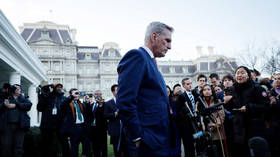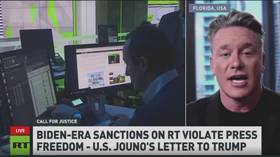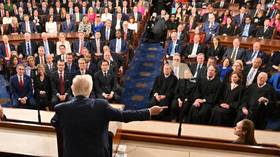What the House of Representatives turmoil means for US foreign policy

Matt Gaetz has attained what nobody has in US political history before, and thus serves as a firm reminder of the times we live in.
For a man whose career seemed doomed to scandal, Gaetz has gone on to claim one of the biggest scalps in American political history by bringing down the speaker of the House of Representatives. This legislative coup has intensified the civil war inside the US Republican Party which signifies a strengthening of the Trumpian MAGA position. The crime that brought now-former Speaker Kevin McCarthy down was to allegedly agree all too willingly to the terms of Democratic President Joe Biden’s administration to avert a government shutdown.
It is in these days of toxic politics in Washington, DC that government shutdowns have become the norm, not an exceptional crisis, when rival parties control the House of Representatives and the White House. Usually, the party that controls the House immediately uses its budgetary powers to hold the administration to ransom over critical issues and inflict maximum political damage. Former Democratic Speaker Nancy Pelosi did just that with then Republican President Donald Trump and his border wall funding, bringing his signature platform project to a humiliating end. So why wouldn’t the Republicans be all too willing to do the same to Joe Biden, especially with an election on the horizon?
Herein lay McCarthy’s naivete. His disavowal of the hardliners in his party ultimately punished him and cost him his position. Now the MAGA lawmakers are in the ascendency again and will use their newly attained influence to try to inflict critical wounds on the Biden administration. In the area of foreign policy, this is going to lead to some instability as they will sabotage efforts to achieve moderation and will actively challenge the White House’s position on both Russia and China simultaneously. This could be good news for Moscow, but potentially bad news for Beijing.
First, the MAGA faction led by Gaetz is opposed to sending more aid to Ukraine and unsympathetic to the Biden administration’s pursuit of pumping billions into the conflict and continual escalation. This was reflected in the stopgap funding deal to avert the government shutdown, which did not include any additional funding for Ukraine. Although it was pledged that a new funding package would be discussed between the speaker and the Biden administration, the removal of Kevin McCarthy, the advance of the MAGA position and upcoming political drama will render this extremely difficult. This does not mean the MAGA lawmakers have any love for Russia or are averse to funding wars overseas; what they want is to undermine Biden and the Democrats, or at least extort concessions from them – and the Ukraine issue is just one of the means to that end.
On the other hand, the strengthening of the MAGA faction will intensify US antagonism towards China by seeking to undermine any effort by the Biden administration to at least stabilize ties. The right wing of the Republican Party sees Beijing as the real main enemy, not Moscow, and will use its newfound congressional influence to push more aggressive legislation and moves against Beijing in ways which unsettle the White House.
Kevin McCarthy was already having to balance these sentiments, which is why he chose to meet Taiwan’s leader, Tsai Ing-wen, in California, as opposed to visiting Taiwan itself, to avert a crisis. In contrast, a more hardline Republican will seek to antagonize Beijing and actively provoke a crisis, as well as permitting the legislation of the anti-China hardliners on the new House Select Committee on Strategic Competition between the United States and the Chinese Communist Party.
If anti-China movements from Congress intensify, the Biden administration is more likely to embrace it than to push back against it. Especially in the run-up to an election, the current White House fears appearing “weak” on Beijing and will bandwagon on anti-China momentum in order to rebuff critics and reaffirm its own popularity. This gives leading hawks in the House of Representatives an opportunity to derail any moderation in foreign policy and push their own agenda. Consider that even Nancy Pelosi, a Democrat, was prepared to do this. Likewise, moments such as the Chinese “spy balloon” incident demonstrated the administration’s clear lack of control. This means partisan infighting and polarization will pose risks for US-China relations.
In a nutshell, the crisis in the House of Representatives and the subsequent factional power struggle represents another consequence of the long-term destabilization of US domestic politics, which in turn will affect the calibration of US foreign policy. The strengthened MAGA Republicans will seek to more actively antagonize, as opposed to compromise, with the Biden administration, as they eye the coming election. This means undermining the White House’s established positions on both Russia and China will be on the agenda. Unpredictability lies ahead.
The statements, views and opinions expressed in this column are solely those of the author and do not necessarily represent those of RT.















